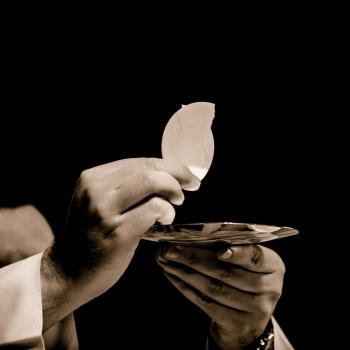 Ash Wednesday, like other days in the Christian calendar, is designed to encourage spiritual reflection. But in a culture that is easily bored and longs endlessly for relevance, the nature and purpose of that day is easily lost.
Ash Wednesday, like other days in the Christian calendar, is designed to encourage spiritual reflection. But in a culture that is easily bored and longs endlessly for relevance, the nature and purpose of that day is easily lost.
So, over the years, we have developed liturgies that don’t require reflection, like Ashes to Go: “I won’t have time to go to Mass today,” declared one participant.
We have combined ashes with glitter to symbolize inclusion, or even pride. “LGBT people are people of faith, too. … On the day, Ash Wednesday, when Christians are publicly Christian, we are going to be publicly queer,” declared the executive director of Parity.
And this year, my own denomination has been called to spend Ash Wednesday and the Lenten season meditating on cases of sexual harassment, exploitation and abuse.
Although there is a good chance that I won’t be heard, I should note – here and now – that there are inspirations behind each of these uses of Ash Wednesday that have undeniable merit. But that does not mean that the day or the Lenten season should be repurposed in those ways.
As the liturgy itself makes clear, Ash Wednesday revolves around the call to penitence and a reminder of our mortality. Immediately following the sermon, the priest declares:
Dear People of God: The first Christians observed with great
devotion the days of our Lord’s passion and resurrection, and
it became the custom of the Church to prepare for them by a season of penitence and fasting. This season of Lent provided
a time in which converts to the faith were prepared for Holy
Baptism. It was also a time when those who, because of
notorious sins, had been separated from the body of the faithful
were reconciled by penitence and forgiveness, and restored to
the fellowship of the Church. Thereby, the whole congregation
was put in mind of the message of pardon and absolution set
forth in the Gospel of our Savior, and of the need which all
Christians continually have to renew their repentance and faith.I invite you, therefore, in the name of the Church, to the
observance of a holy Lent, by self-examination and repentance;
by prayer, fasting, and self-denial; and by reading and
meditating on God’s holy Word. And, to make a right beginning
of repentance, and as a mark of our mortal nature, let us now
kneel before the Lord, our maker and redeemer.
It is meditation on these two facts of our existence and our dependence upon God to address our condition around which both Ash Wednesday and the Lenten season revolve. By confronting the church with those perennial truths about ourselves, the liturgy demands that we take time to contemplate our condition. It confronts us with our sinfulness and it reminds us of our mortality – all in the name of receiving the grace of God.
To divert us from those challenges by narrowing or even eliminating the spiritual demands that the liturgy makes of us is to run the risk of subverting its purpose. It becomes too easy to assert ourselves, rather than reflect in honest ways on our behavior. It becomes too easy to talk about the sins of others, rather than grapple with our own sin. It becomes too easy to put our sins aside in favor of talking about an institutional or societal failing. And it becomes too easy to rush through the whole day, content in saying that we are too busy to meditate. Prayers of confession on that day may include the failings that our leaders would like for us to discuss, but to make a specific kind of failing the focus of our Lenten prayers is a strangely narrow way of bringing the church face to face with its complete dependence upon God.
We are all called to oppose any evil that subverts the redemptive purposes of God, but preparation for that challenge begins by contemplating our own sins and mortality. That is the only way to be fully available to God’s work in us and in the world.
So, I will start there, as every mortal must.












